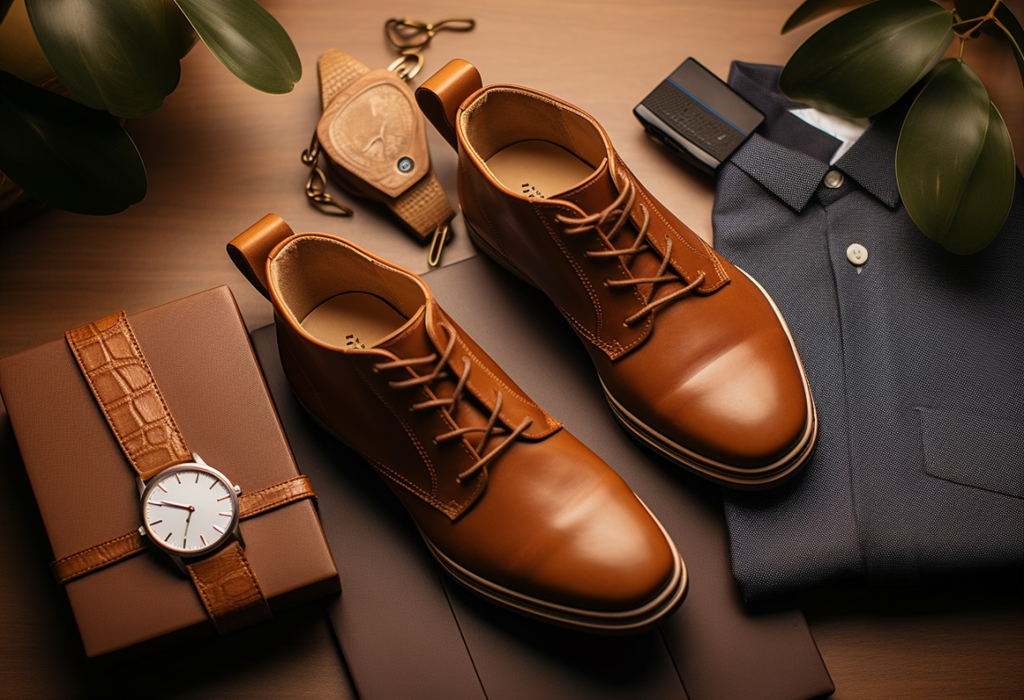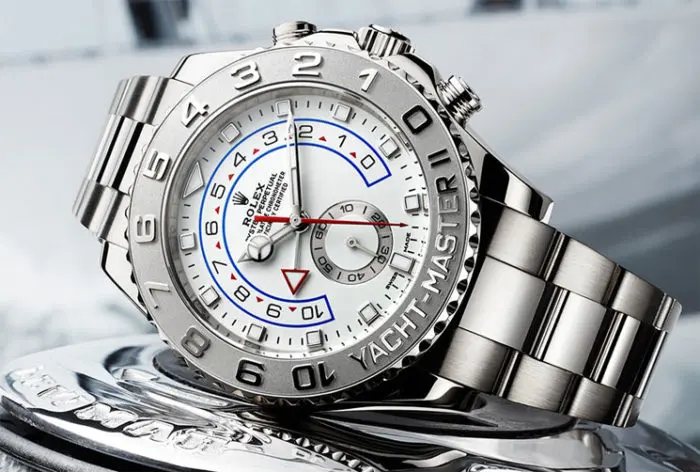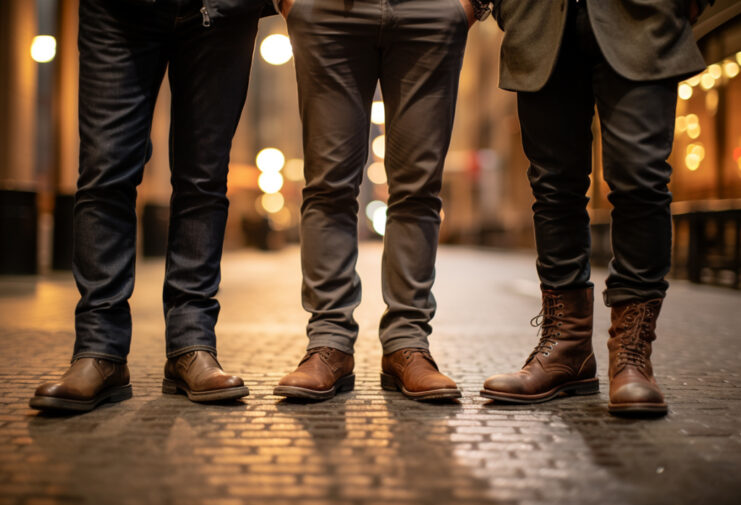Pineapple leaves.
Fish scales.
Mushrooms.
Would you wear shoes made of this?
If you refuse to wear animal hide…what are your options?
You still need dress shoes…
and you want to wear them year round.
Without compromising style.
Or comfort.
Is leather the gold standard for shoes?
Are there non-leather materials that match the quality of leather shoes?

I have had many questions over the years about recommending shoes that are not made from leather.
This article is for the vegan shoe men out there.
Finding good-looking and well-made dress shoes that are not leather is a difficult task.
But I finally found an answer!

This article is brought to you by Charlie Butler Shoes.
If you're looking for vegan shoes for men that are just as durable & weather resistant as leather is, then check out Charlie Butler.
They produce ethically made shoes that are environmental and animal-friendly.
Artisans spend 4 hours on each pair of shoes, crafting and perfecting them by hand.
What's The Difference Between Leather & Vegan Shoes?
Have you ever wondered…
Where do my leather shoes come from?
Leather can be made from cows, goats, sheeps, pigs, and exotic animals such as alligators, ostriches, and kangaroos. Some argue that leather is a by-product of the meat industry, but often (especially in the case of exotic animals), meat is the by-product.
Why would anyone consider not wearing leather shoes?
Leather is a lucrative co-product of meat and shares responsibility for the environmental impact of animal agriculture.
A variety of alternatives have been developed for vegans (and vegetarians) who are generally concerned about animal rights. For those who avoid wearing leather shoes because they believe it equates to animal cruelty, new materials are produced which mimic the aesthetics of leather.
One such option, vegan leather, is generally produced by bonding a plastic coating with a fabric backing. Vegan microfiber is similar to leather in appearance, durable, breathable, and flexible – making it an ideal alternative to organic leather.
In essence, vegan shoes are produced without the use of animal-based products.
Is Leather The Best Option For Shoes?
Leather has been the preferred option for shoes because of its durability and flexibility. The pores in the material always allow the foot to breathe and shoes made from leather are stylish and versatile (suitable for a wide variety of occasions).
However, apart from the high cost of quality leather shoes and the heavier weight of this material, there are ethical reasons to consider a substitute.
To prevent it from naturally decomposing, an animal hide needs to be treated. Skin is turned into leather using toxic chemicals, including formaldehyde, mineral salts, and coal-tar derivatives.

The tanning process utilizes dangerous elements to remove the hair from the hide and can clog the pores of the leather, altering it's natural abilities. Without this process, the leather that your shoes are made of would rot right off your feet.
This process of making leather ready for everyday use leaves a negative impact on the environment and the workers. Those living nearby are also affected by the hazardous chemicals.
Vegetable tanned leather is a much more environmentally friendly option than conventional leather. It is also a more expensive option and still poses a significant environmental impact caused by the rearing of livestock.
So, what are the top three alternatives to those who prefer to wear non-leather shoes?

3 Non-Leather Options For Shoes
Most non-leather options are either made from canvas, synthetic or faux leather options.
1. Vegan Shoes
If you are a vegan, vegetarian or environmentally conscious consumer, shoes made from vegan leather are a logical choice for you.
Pros:
- Cruelty-Free: These shoes are produced without the use of animal-based materials.
- Comfortable: Vegan material, a faux leather microfibre material is breathable, flexible, and supple right from the first wear.
- Custom-Sizing: Vegan leather molds around your feet, allowing for a unique and perfect fit.
- Aesthetics: The material ages beautifully with each wear and presents a beautiful, organic texture. It looks and shines like leather.
- Hand-Crafted Workmanship: Ethical brands that produce vegan shoes tend to be on the expensive side but the high retail value is indicative of the effort that goes into handcrafting each pair of shoes.
Feels Natural: A shoe made with vegan leather feels natural and weightless, almost like you're walking barefoot.
Cons:
- Durability: Vegan shoes can wear out quicker than leather shoes. Although they are less durable than leather shoes, you can make them last longer by taking care of the shoes. Simply avoid walking miles in inclement weather while wearing them. When such a situation is unavoidable, clean the shoes straight away.
- Versatility: Unless you find a rare brand that produces stylish shoes that look and feel like leather, vegan shoes are restricted to smart casual and casual outfits.
Charlie Butler makes stylish vegan leather shoes that are durable, soft and comfortable from the first wear.
2. Synthetic Shoes AKA Faux Leather
Shoe manufacturers come out with new materials each year including simulated leathers, plastic, and rubber. Naugahyde, Durabuck, pleather, NuSuede, and Hydrolite are all synthetic options which are as good as leather to the untrained observer.
A pair of shoes made from a synthetic material is comparable to leather shoes. If choosing shoes made from faux leather, watch out for cheap and heavy material.
Pros:
- Man made fabrics hold color and designs easier.
- It is also easier to make synthetic shoes water resistance which makes them lighter in wet conditions and much easier to clean.
- Modern synthetics are lighter and thinner materials but can have a vast range of quality so it’s important to look for material designed to have specific advantages.
Cons:
- Since the shoe is inorganic, it tends to keep its original form, taking longer to break-in.
- Synthetic leathers tend to break down easier and they don't wear as nicely as real leather.
- Since they're plastic, they easily wear away and tear at stress points. Especially in the parts where the shoe bends. You may find yourself throwing away the shoe after just a few months of wear.
- Petrolem-based synthetic leathers often cause pollution from manufacturing and its waste.
- Synthetic leather doesn't provide the warmth and protection for your feet that real leather does.
- Synthetic alternatives are not easily biodegradeable and problematic to dispose of when they wear out. Theyse products consume large amounts of energy in the manufacturing process.
3. Canvas Shoes
Canvas shoes are an inexpensive and easy to maintain fabric option for footwear.
Pros:
- The shoes are lightweight, flexible, durable, and can be cleaned in a washing machine when dirty.
- Canvas shoes are considered “sweat-free” as air flows through them and around the foot.
- It is possible to wear canvas barefoot without socks without getting them smelling or getting too hot.
Cons:
- Canvas is not as versatile as leather footwear. They are suitable for a casual style. Leather shoes, on the other hand, can be worn for breakfast/lunch and then to a bar/dinner at night.
- Canvas shoes are cheaper than leather but the lightweight of the material makes them appropriate mainly for the summer months.
After considering the pros and cons, I would recommend vegan shoes as the closest alternative to replace your current leather shoes.
Need additional reasons to consider going vegan with your shoes?
- The production of vegan leather requires no animal rearing and slaughter.
- No grain is required to be watered and harvested for feed. And this material is produced in factories, requiring no land and water for livestock.
Looking for Vegan shoes that have everything a conscious consumer would look for?
Charlie Butler produces ethically made shoes that are environmentally and animal-friendly.
Artisans spend 4 hours on each pair of shoes, crafting and perfecting them by hand.








